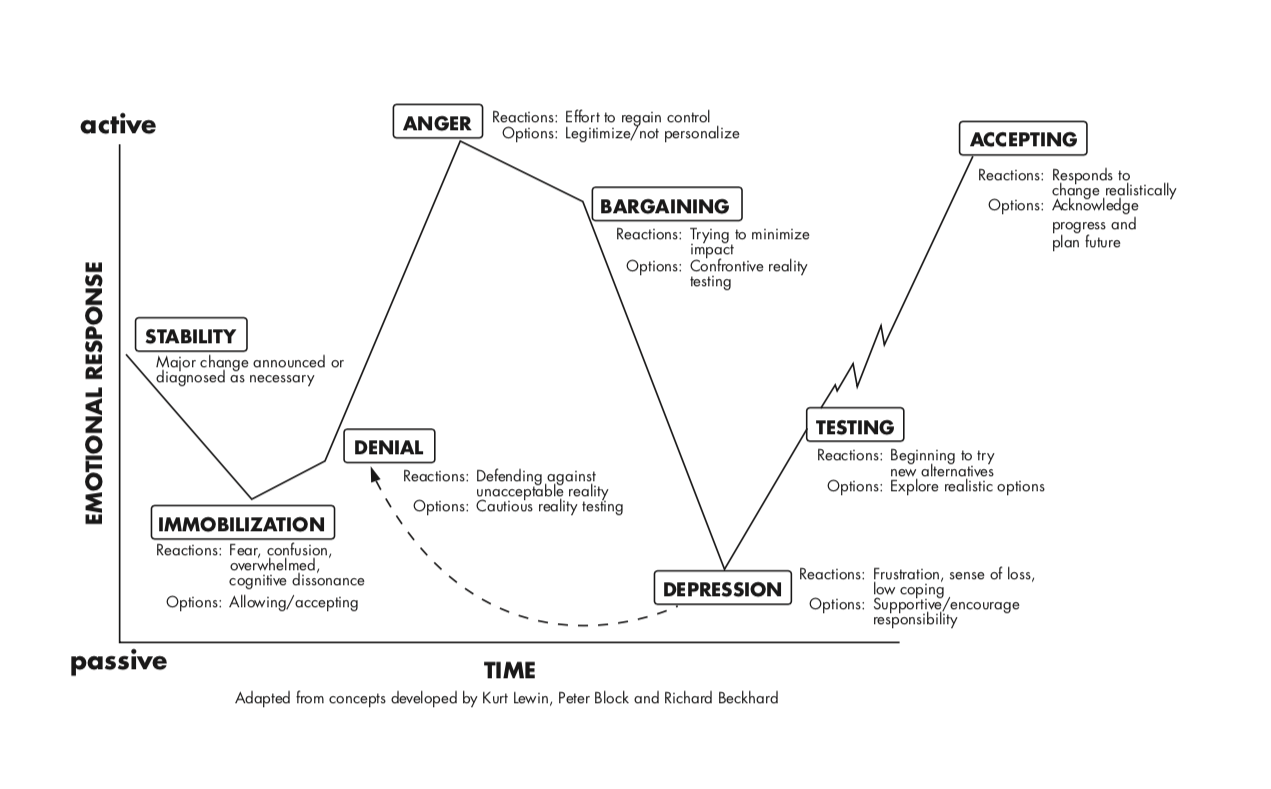Elisabeth Kubler-Ross in her book On Death and Dying brought into the modern lexicon the notion that when people are first told that they have a terminal illness they will often experience a sequence of emotions in order to psychologically cope with the news. This model was quickly adopted by other scholars and practitioners to help counsel people dealing with a number of other dystressful life issues: separation from a spouse or loved one, involvement in a traffic accident, job loss, a move to another city.
Kubler-Ross gives five stages of emotional responses but I have found in my career counseling practice that there may be more than that. The usual sequence is Immobilization at first (shock), soon followed by Denial (KR Kubler-Ross) (this can’t be happening), Anger (KR) (how can you do this to me?), Bargaining (KR) (what will it take to put things back?), Blaming (self, other), Depression (KR), Exploration and then finally Resolution (Kubler-Ross called this stage Acceptance).

Emotional Response to change chart
When I am counseling my clients in career transition I reference the experience of receiving notice of a terminal illness as a metaphor for notice of job loss – termination?! (it’s not as dreadful as it sounds). The emotional response is the same. I also remind people that these emotional responses also occur in response to all sorts of life changes and events. People find it somehow comforting to know that what they are feeling is quite common. They find it interesting that in reviewing the model they realize they have already experienced many of these emotions in the loss they are going through. And they find it comforting that (almost) everybody reaches resolution, eventually.
It turns out that it’s not just the person directly affected by the loss who experiences this range of emotion; those close to them also have similar emotions, either in sympathy or as a consequence. The spouse may not be the one to have lost his/her job but soon finds the need to confront the same fears. The more dependent the spouse the more acute the fears, naturally. I have seen the wife more angry with her husband’s former boss than her husband is. I also counsel my client to be aware that the spouse may not be capable of showing the support and comfort that is needed in the moment – they are pre-occupied with their own grief. It is a romantic fantasy that marriages strengthen under adversity. Too often the opposite is true: the wife turns her anger and blame on the husband who has lost his job – how you could you do this to me?!?
It is also interesting to note that friends or associates of the person experiencing loss may have difficulty responding or showing support. They may not be experiencing the emotional grief themselves but they are nevertheless uncomfortable with the distress of the other. They don’t know what to say or do and in consequence, avoid. I ‘warn’ my clients to expect the unexpected from their friends and colleagues: those you thought would be there for you may disappear; those you never imagined would be the ones to step up, do. Most fall somewhere in between but one thing is certain, the relationships are never the same.
In my recent experience of my wife being diagnosed with terminal cancer the irony of the job loss metaphor has not escaped me. We have passed the anger, and blaming, phases and are resolved in guarded hope for some good years yet to come. I have also found it somewhat disconcerting and disappointing to have been ‘abandoned’ by some of my friends. But I am very grateful for the support I have had from others, some quite surprising.





